What to know about Germany’s new digital healthcare law

A law passed in the Bundestag is being hailed as a "quantum leap" in German healthcare and will allow for patients' records to be shared digitally and access to files via apps. Here are the key changes you need to know about.
Germany is known to lag behind when it comes to digitisation in the healthcare system with strict (and some would argue outdated) privacy legislation often hampering digital communication between departments.
Now there has been a real breakthrough for useful better care, with a law passed in the Bundestag on Thursday allowing for electronic prescriptions and digital files for important health data are set to become standard for millions of patients.
E-prescriptions will be mandatory in practices from the beginning of 2024, and from the beginning of 2025 everyone with statutory health insurance should receive e-patient files - unless they opt out.
Until now, important data has been distributed on servers in practices and hospitals where patients were treated in the past, which can cause problems and delays when they change practices or go to another provider.
German Health Minister Karl Lauterbach spoke of a “quantum leap” in digitisation in the healthcare system, adding that until now the treatment had been “suboptimal”.
Electronic Patient Records
Electronic patient records (ePA) will be a personal data storage that accompanies you throughout your life.
Medical data will be packaged together, which is intended to avoid drug interactions and multiple examinations. E-files were introduced as an optional offer in 2021, but so far only around one percent of the 74 million people with statutory health insurance have signed up for it.
The government’s new goal is to get 80 percent of people to have ePAs by 2025, and switching to the “opt-out” principle: according to the new law, the health insurance companies should provide information and automatically set up an e-file for everyone by January 15th, 2025 - unless you actively opt out.
READ ALSO: How German health insurance costs are set to rise from 2024
Healthcare apps
The e-file with certain identification rules should be accessible via apps of health insurers like Techniker Krankenkasse (TK) or AOK.
You should be able to decide for yourself what doctors can set and who can access what, as well as being given an overview of your medications, and lab results among other information. If you change health insurance, you should be able to take your data with you. The ministry explained that people without a smartphone could view their ePA in selected pharmacies.
Ombudsman offices of the health insurance companies are intended to support insured people who cannot manage the ePA via the app.
REDA ALSO: How Germany wants to roll out e-prescriptions and digital patient records

The insurance cards of the health insurance companies DAK, AOK, Barmer and Techniker-Krankenkasse TK lie with euro notes under a stethoscope. Photo: picture alliance / dpa | Daniel Karmann
The Green MP Janosch Dahmen, a medical doctor who focuses on health issues, said that in the future not only practicing professionals would be able to see relevant information in one place, but patients themselves would be able to see their own medical records for the first time.
Doctors and health insurance companies however warned of pitfalls.
Sick notes for childcare by the phone
Following on from the introduction of phone-in sick notes for adults on December 7th, there's been a new step forward in getting doctors' notes for time off work remotely.
Parents will be able to obtain medical certificates stating that they need to care for a sick child by telephone without visiting the practice from December 18th as part of legislation on the same day.
READ ALSO: How Germany could bring back telephone sick notes sooner than expected
According to the umbrella organisation for health insurers (GKV), certificates for the receipt of child sickness benefits should be able to be issued for a maximum of five days if the child is known to the doctor and they consider issuing it over the telephone to be justifiable.
“This will significantly reduce the burden on parents and doctors’ practices,” a GKV spokesperson said.
Comments
See Also
Germany is known to lag behind when it comes to digitisation in the healthcare system with strict (and some would argue outdated) privacy legislation often hampering digital communication between departments.
Now there has been a real breakthrough for useful better care, with a law passed in the Bundestag on Thursday allowing for electronic prescriptions and digital files for important health data are set to become standard for millions of patients.
E-prescriptions will be mandatory in practices from the beginning of 2024, and from the beginning of 2025 everyone with statutory health insurance should receive e-patient files - unless they opt out.
Until now, important data has been distributed on servers in practices and hospitals where patients were treated in the past, which can cause problems and delays when they change practices or go to another provider.
German Health Minister Karl Lauterbach spoke of a “quantum leap” in digitisation in the healthcare system, adding that until now the treatment had been “suboptimal”.
Electronic Patient Records
Electronic patient records (ePA) will be a personal data storage that accompanies you throughout your life.
Medical data will be packaged together, which is intended to avoid drug interactions and multiple examinations. E-files were introduced as an optional offer in 2021, but so far only around one percent of the 74 million people with statutory health insurance have signed up for it.
The government’s new goal is to get 80 percent of people to have ePAs by 2025, and switching to the “opt-out” principle: according to the new law, the health insurance companies should provide information and automatically set up an e-file for everyone by January 15th, 2025 - unless you actively opt out.
READ ALSO: How German health insurance costs are set to rise from 2024
Healthcare apps
The e-file with certain identification rules should be accessible via apps of health insurers like Techniker Krankenkasse (TK) or AOK.
You should be able to decide for yourself what doctors can set and who can access what, as well as being given an overview of your medications, and lab results among other information. If you change health insurance, you should be able to take your data with you. The ministry explained that people without a smartphone could view their ePA in selected pharmacies.
Ombudsman offices of the health insurance companies are intended to support insured people who cannot manage the ePA via the app.
REDA ALSO: How Germany wants to roll out e-prescriptions and digital patient records

The Green MP Janosch Dahmen, a medical doctor who focuses on health issues, said that in the future not only practicing professionals would be able to see relevant information in one place, but patients themselves would be able to see their own medical records for the first time.
Doctors and health insurance companies however warned of pitfalls.
Sick notes for childcare by the phone
Following on from the introduction of phone-in sick notes for adults on December 7th, there's been a new step forward in getting doctors' notes for time off work remotely.
Parents will be able to obtain medical certificates stating that they need to care for a sick child by telephone without visiting the practice from December 18th as part of legislation on the same day.
READ ALSO: How Germany could bring back telephone sick notes sooner than expected
According to the umbrella organisation for health insurers (GKV), certificates for the receipt of child sickness benefits should be able to be issued for a maximum of five days if the child is known to the doctor and they consider issuing it over the telephone to be justifiable.
“This will significantly reduce the burden on parents and doctors’ practices,” a GKV spokesperson said.
Join the conversation in our comments section below. Share your own views and experience and if you have a question or suggestion for our journalists then email us at [email protected].
Please keep comments civil, constructive and on topic – and make sure to read our terms of use before getting involved.
Please log in here to leave a comment.